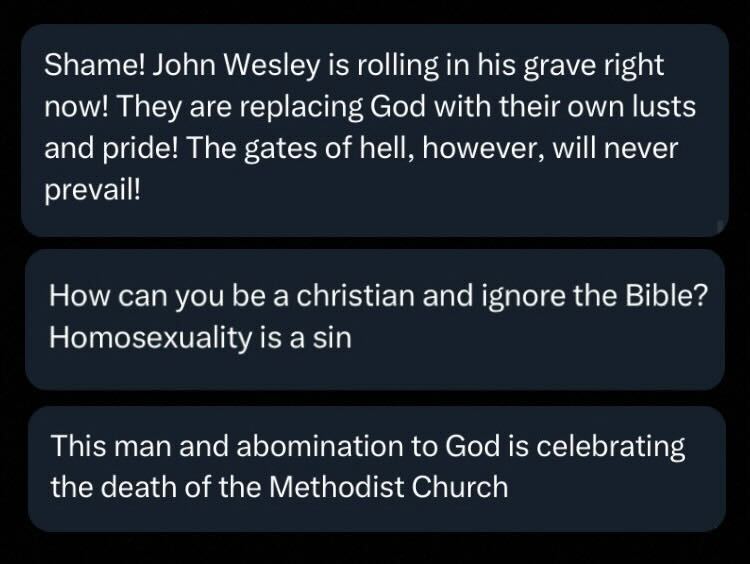“I Did Not Think This Change Would Come in My Lifetime”
A seminary dropout on the latest decision from the United Methodist Church
By Bailey Wayne Hundl
For the last 25 years, pastors in the United Methodist Church (UMC) have faced losing their jobs and having their ordination revoked for officiating same-sex weddings—even when doing so for their own children. The UMC bylaws have also prohibited “self-avowed practicing homosexuals” from being ordained as ministers—or appointed to serve in any capacity—since 1984.
All of that changed on Wednesday. With an overwhelming majority and no debate, the denomination’s highest legislative body voted to overturn these policies.
For me, this is personal. For the better part of a decade, I was one of those pesky “self-avowed practicing homosexuals” causing trouble in the UMC. (That link has my deadname, but I’ll be cool about it if you will.) While I was in seminary, I even sought ordination through the UMC—though admittedly, I didn’t make it very far. And when I think about all the shit I’ve seen, I have to be honest: I did not think this change would come in my lifetime.
When I was 19 years old, I interviewed for an internship with a youth pastor at a UMC church. It went phenomenally (mainly on account of me being awesome and a Capricorn rising). The youth pastor even told me, “I have other people to interview, but if I’m being honest, you’re perfect for this and this is perfect for you.” I said that that was great, but that before we finished, there was one last thing he should know about me; I told him I was gay. And he asked me to leave.
I went home fuming but undeterred, a feeling that, over the years, became all too familiar. When I was 20, I attended a UMC legislative session reviewing the church’s restrictive bylaws against gay people. Before the vote, anyone could come to the mic and speak for or against the issue—and the lines for both were long. I remember the burning of my ears and the tight grip of my friend’s hand in mine as one woman droned on about the dangers of the “demon” of homosexuality and how we must do anything in our power to stop it. In that same room two years later, at a conference for queer Christians, I watched my friend break down in tears as he described being exorcized by his foster parents, who later disowned him.
I carry too much pain from these experiences to expel in one short article. Do I mention my first pastoral internship, the one I accepted before I came out, where I waited for my host family to fall asleep so I could whisper over the phone to my boyfriend that I loved him? The otherwise progressive church who kicked a gender-nonconforming member out of their choir for being “too distracting”? Or hell, what about the responses I received just yesterday when I tweeted in celebration?

For years, I grew more and more battle-hardened, staying in the fight (and the church) for three reasons: my love for the faith, my love for queer people, and the notion that somebody had to clean up this mess. Eventually, I made the choice so many have: I left for my own sanity.
I know that for many people, this seems like the obvious choice. “If the church is homophobic, why don’t you just leave?” But when we buy into the false dichotomy of Religious vs. Queer (a dichotomy invented by homophobes, mind you), we force queer people to sever themselves from a crucial aspect of themselves, something that gives their life meaning, community, and hope. And I’ve watched too many people—people I love, people I miss—pick the former.
But now, thanks to this monumental decision brought about by the stubborn hopefulness of queer Methodists and their allies, fewer of my family will be forced to leave themselves behind. It’s a good day.